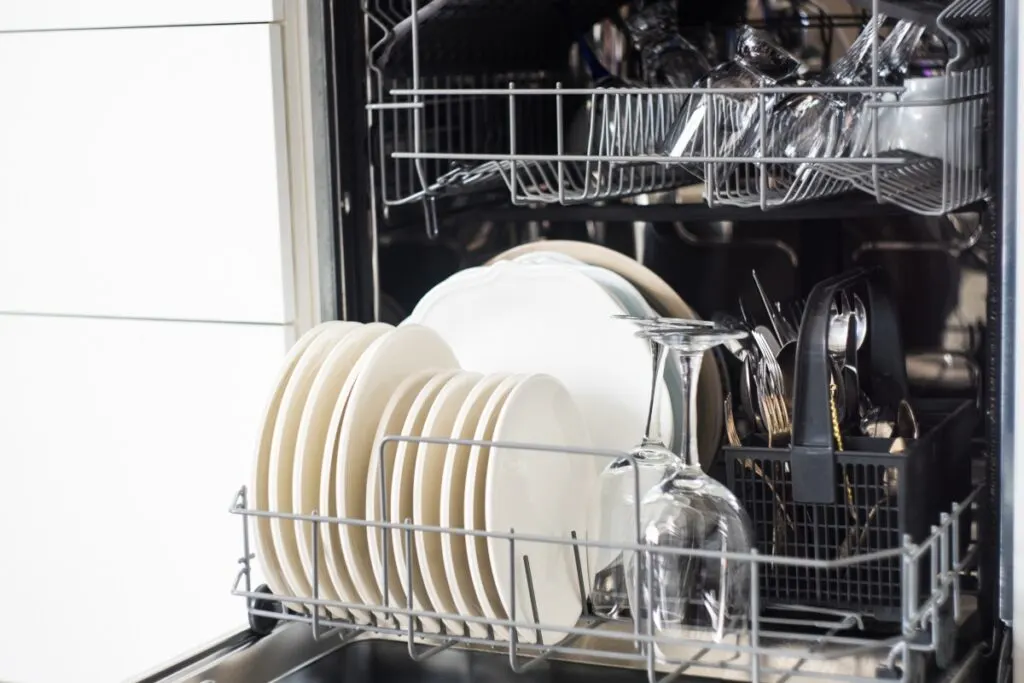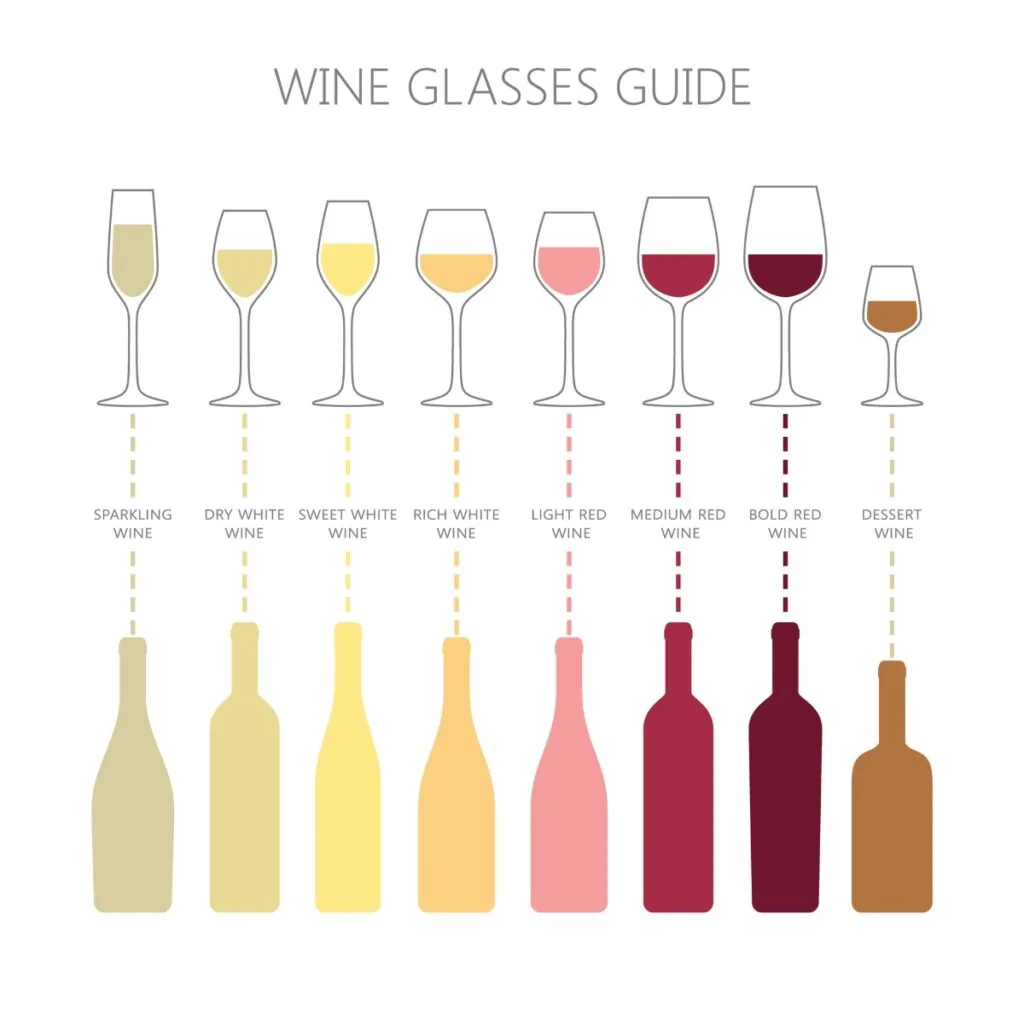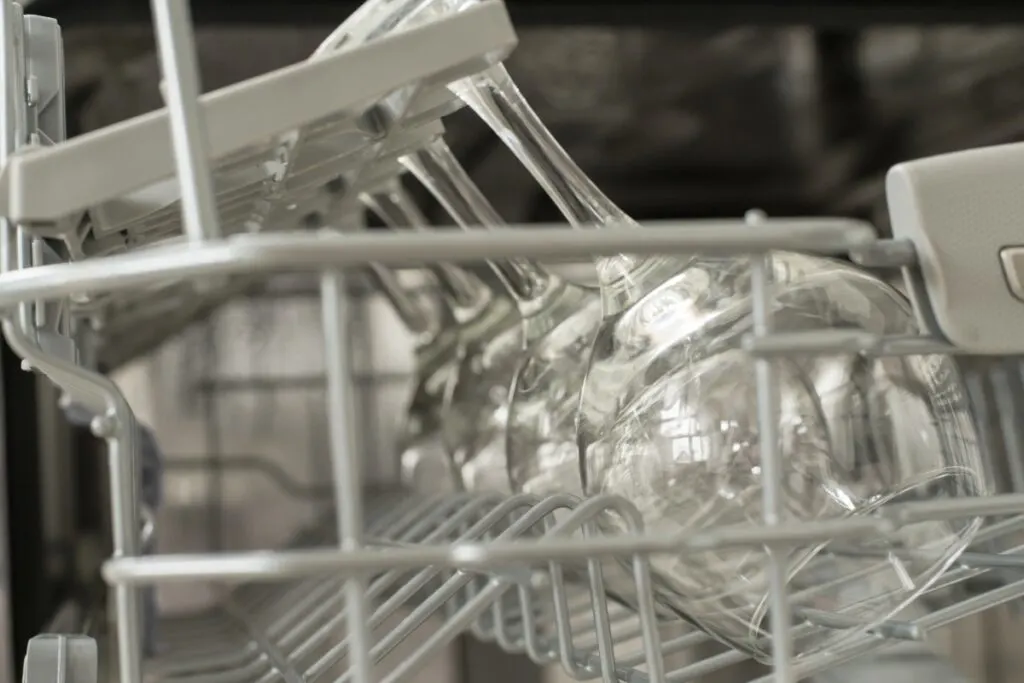As an Amazon Associate, I earn from qualifying purchases with no additional costs for you.
It is generally considered a good idea to put wine glasses in the dishwasher. Using a dishwasher can save time and energy compared to washing the glasses by hand and also help ensure that glasses are cleaned thoroughly.
However, it is essential to note that not all glasses are dishwasher safe, and some wine glasses may not be washed in a dishwasher. Best practices must be observed, too, like always correctly loading the dishwasher to ensure that wine glasses are cleaned effectively.
Even though the convenience of putting your glasses in the dishwasher cannot be beaten, sometimes it is recommended to hand-wash wine glasses to preserve their delicate structure, maintain the taste and aroma of the wine and avoid any health hazards or damage to the intricate designs.
The article below will examine all aspects of putting wine glasses in the dishwasher, including when not to do so!

TIP: If you want to check out the best refrigerator for wine storage, I recommend trying out the Avation (18 bottles) compressor refrigerator with Wi-fi smart app control cooling system. You can find this refrigerator by clicking here (Amazon link).
Why do Wine Glasses Break in the Dishwasher
Wine glasses can break in the dishwasher for several reasons. The most common reasons are heated, using the wrong detergents, vibration, improper use of the dishwasher//user error, and quality (or lack of quality) of the glassware. Let’s look at each one of these in detail below.
Heat: The high temperatures used in the dishwasher can cause the stem of the glass to weaken and eventually break. The heat can also cause thermal shock, which occurs when a glass is rapidly exposed to a change in temperature, such as when a hot glass is placed in cold water. This can cause the glass to crack or break.
Detergents: The detergents used in dishwashers can leave a residue on the glass, affecting the wine’s taste and aroma. Additionally, the extreme cleaning action of the detergent can cause scratches on the glass’s surface, weakening the glass’s structure over time and making it more prone to breaking.
Vibration: The dishwasher’s cleaning cycle involves a lot of movement and vibration, which can cause glasses to knock against each other or the sides of the dishwasher. This can cause chips or cracks on the glass’s rim or bowl.
Improper loading: The glasses should be loaded correctly in the dishwasher; the stem of the glass should not be pointing upwards, as this can cause the stem to break or cause the glass to tip over.
Quality of Glass: Wine glasses are often made from lead crystal or glass that contains lead, which is more delicate and fragile than regular glass, hence more prone to breaking.
Can You Dishwasher Wine Glasses
You can dish wash wine glasses as long as you take a few precautions, such as making sure your dishwasher is up to standards so as not to harm the glasses, using a mild detergent instead of a harsh one, loading the dishwasher correctly, and setting the temperature to a mild rather than a hot one.
Let’s look at each of these factors to consider in detail below:
Quality of the dishwasher: Some dishwashers have a delicate or hand-wash cycle specifically designed for fragile items like wine glasses. These cycles use lower heat and gentler cleaning action to reduce the risk of damage to the glasses.
Detergent: Use a mild detergent designed explicitly for dishwashers, and avoid using too much detergent as it can leave a residue on the glasses.
Loading: Properly load the glasses in the dishwasher, ensuring that the glasses are not stacked too closely together or touching the sides of the dishwasher.
Temperature: Use the lower temperature setting if your dishwasher has that option.
TIP: Stemless wine glasses have become increasingly popular in recent years. Check out the main reasons why you should buy stemless wine glasses in this article.
What Makes Wine Glass Not Dishwasher Safe
Putting wine glasses in the dishwasher can be unsafe because the high heat and harsh detergents used in the dishwashing process can damage the delicate stem and bowl of the glass.
The heat can cause the stem to weaken and break, and the detergents can leave a residue on the glass that can affect the taste and aroma of the wine.
Additionally, the extreme cleaning action of the dishwasher can cause scratches on the glass’s surface, weakening the glass’s structure over time and making it more prone to breaking.

Wine glasses are often made from lead crystal or glass that contains lead, which can cause lead to leach into the wine if the glasses are washed in the dishwasher. This can be a health hazard, especially for people who drink wine regularly.
Another reason against putting wine glasses in the dishwasher is that the glasses are often hand-crafted and have intricate designs, which can be damaged by the dishwasher’s cleaning process and may lose their value over time.
As mentioned above, sometimes it is recommended to hand-wash wine glasses to preserve their delicate structure, maintain the taste and aroma of the wine, and avoid any health hazards or damage to the intricate designs.
What Wine Glasses Are Dishwasher Safe
Wine glasses considered dishwasher safe are usually made of tempered glass or machine-made lead-free crystal.
They are dishwasher safe because they are made of materials that can withstand the high temperatures and detergents used in the dishwashing process without becoming damaged or weakened.
Tempered glass is made by heating the glass to a high temperature and then rapidly cooling it. This process makes the glass more robust and durable than regular glass, so it can withstand the heat and agitation of the dishwasher without breaking or chipping.
Machine-made lead-free crystal is made from a combination of soda-lime glass, quartz, and other materials. They are more durable than traditional lead crystal glasses and can withstand the dishwasher’s cleaning cycle without breaking or scratching.
It’s important to note that even if the glasses are made of tempered glass or lead-free crystal, it’s still recommended to check for the manufacturer’s instructions before putting them in the dishwasher, as some manufacturers may recommend hand washing or have specific guidelines for dishwasher use.
How Do You Know if a Wine Glass is Dishwasher Safe
It can be hard to know if a wine glass is dishwasher safe or not, so here is a great tip that can help you to be pretty sure:
Wine glasses considered dishwasher safe are usually made of tempered glass or machine-made lead-free crystal. These materials are durable enough to withstand the high temperatures and detergents used in the dishwashing process.
To be 100% sure, however, following the manufacturer’s instructions and guidelines on your particular glassware is always recommended.
TIP: Bringing your favorite bottle of wine from your holiday trip can be tricky. Find out if you can bring a bottle of wine to a plane in this article. The options for bringing your own wine on a cruise are covered in this article.
Where Do I Put Wine Glasses in the Dishwasher

It is best to put wine glasses on the top of the dishwasher because they are typically more delicate and fragile than other dishes and need to be handled with care to avoid damage. Placing them on the top rack of the dishwasher will ensure that they are not knocked around during the cleaning cycle.
On the top rack, the glasses will be exposed to the spray of water and detergent, but they will be less likely to come into contact with other dishes, which can cause scratches or chips on the rim or bowl of the glass.
Also, the top rack usually has a stemware holder specifically designed to hold the glasses securely, which can help prevent the glasses from tipping over or breaking.
Placing glasses on the top rack will also prevent them from getting too hot, which can cause thermal shock and cause the glasses to crack or break.
Can Wine Glasses Go in the Bottom of the Dishwasher
Wine glasses cannot go in the bottom of the dishwasher. Putting wine glasses in the dishwasher’s bottom rack exposes them to the risk of breaking, chipping, and damage from detergent, heat, and water pressure.
These risks are more significant than placing them on the top rack, where they are less likely to come into contact with other dishes and exposed to less water pressure and heat.
Let’s look at these factors in more detail below!
Risk of breaking: The dishwasher’s bottom rack is typically where heavier and more durable dishes are placed. Putting wine glasses on the bottom rack exposes them to the risk of being knocked around and broken by heavier dishes.
Risk of chipping: The bottom rack is more likely to have other dishes rubbing against the glasses and can cause chipping or scratches on the rim or bowl of the glass.
Risk of damage from detergent: The bottom rack is closer to the detergent dispenser, and the glasses may be exposed to a higher concentration of detergent, damaging the glass.
Risk of damage from heat: The bottom rack is closer to the dishwasher’s heating element, which can cause the glasses to get too hot and potentially crack or break due to thermal shock.
Risk of damage from water pressure: The bottom rack is exposed to higher water pressure, which can cause the glasses to knock against each other or the side of the dishwasher, causing damage.
TIP: If you’re scratching your head over whether to chill a glass of red or white wine, we’ve covered you in this article. For more details and even some tips on how to swirl wine like a professional, read this article!
How to Protect Wine Glasses in the Dishwasher
The best practices to keep wine glasses safe when washing them in the dishwasher are to check the manufacturer’s instructions, use a delicate cycle, properly load the glasses, use a mild detergent, avoid abrasive materials, avoid overloading the dishwasher, and air dry the glasses before storing them away.
Read below for more details on each of these suggestions:
- Check the manufacturer’s instructions: Before placing wine glasses in the dishwasher, check the manufacturer’s instructions to ensure that they are dishwasher safe and that there are no specific guidelines for cleaning them.
- Use a delicate cycle: Use a delicate cycle on the dishwasher, which uses lower heat and a gentler cleaning action to reduce the risk of damage to the glasses.
- Proper loading: Properly load the glasses in the dishwasher, ensuring they are not stacked too closely together or touching the sides of the dishwasher. Use the dishwasher’s top rack and the stemware holder if your dishwasher has one.
- Detergent: Use a mild detergent designed explicitly for dishwashers, and avoid using too much detergent as it can leave a residue on the glasses.
- Avoid abrasive materials: Avoid putting any abrasive materials, such as steel wool or scouring pads, in the dishwasher with the glasses.
- Avoid overloading: Overloading the dishwasher can cause glasses to knock against each other and can cause damage.
- Air dry: After the dishwasher cycle is done, allow the glasses to air dry before putting them away. This will prevent any thermal shock, which can cause the glasses to crack or break.
TIP: If you want to check out the best refrigerator for wine storage, I recommend trying out the Avation (18 bottles) compressor refrigerator with Wi-fi smart app control cooling system. You can find this refrigerator by clicking here (Amazon link).
Conclusion
In conclusion, using a dishwasher can save time and energy compared to washing wine glasses by hand, especially if you have a lot of glasses to clean.
Generally, dishwasher safe wine glasses are made of tempered glass or lead-free crystal. These materials are durable enough to withstand the high temperatures and detergents used in the dishwashing process.
We also explored why it is best to put wine glasses on the top rack of the dishwasher and not the bottom because it keeps them safe from damage caused by contact with other dishes, and it’s the best way to protect their delicate structure. It also prevents them from getting too hot and protects them from thermal shock and breaking.
It’s important to note, however, that It’s always recommended to follow the manufacturer’s instructions and guidelines for your particular glassware.
TIP: Check out this page for a complete list of wine products and accessories I love. You’ll find my recommendations for wine refrigerators, decanters, and aerators and the best place to buy wine online. Click here to see the complete listing.
